The light at the end of the COVID-19 tunnel is getting bigger. You’d think that we can all hardly wait to be released from restriction!
We are on the cusp of widespread vaccinations–whoo hoo! Mostly.
If you have hesitancies anticipating the end of COVID-19, you are not alone
There are quiet conversations daily about the fears arising as we approach summer and changes to the level of restrictions. While we have all anxiously awaited the time when we could be together, hug our people, have friends around the dinner table and go to the gym again—now the anxiety is rising because we are on the threshold of being able to do all those things again.
Fears with change are normal—even with good change.
It’s ok to be afraid.
It’s quite expected, actually.
Change is hard.
It’s hard when you tell your body “don’t” for months.
For many months, we’ve told ourselves, don’t :
- get close
- go out
- take off your mask
- have them over
- go outside your bubble.
Your body does not understand the English language.
Bodies do understand the language of fear. Bodies also speak the language of safety. But here’s the thing:
Fear yells. Safety whispers.
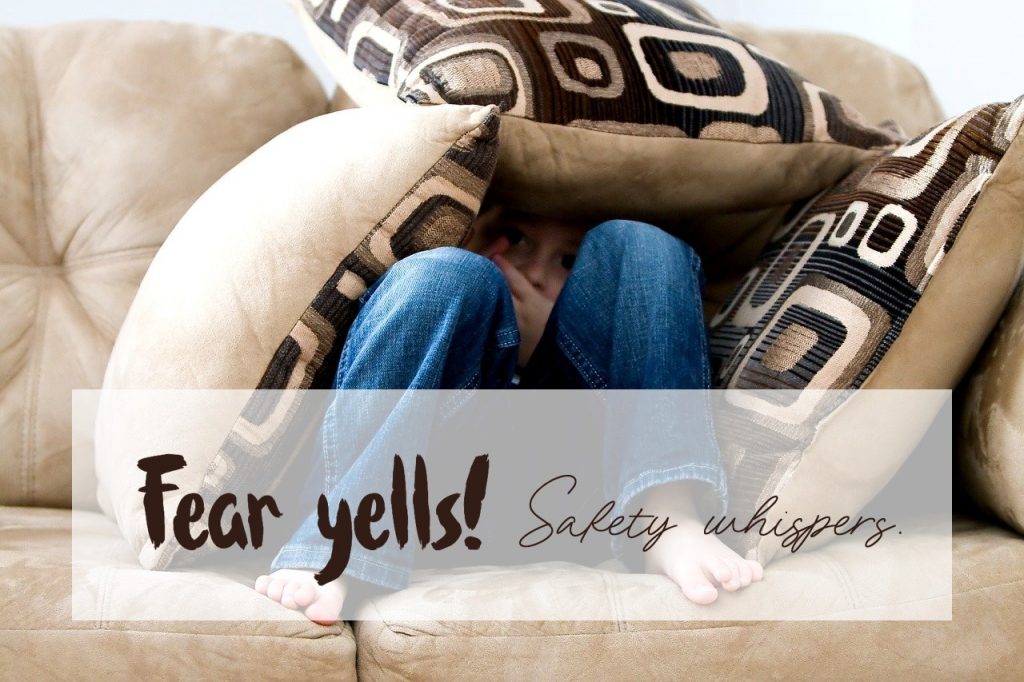
It will take some time for the body to get the message that it’s okay.
For months, we have been telling our brains messages of danger and caution. We have been giving ourselves instructions to stay at home, avoid people–those neural pathways have had a chance to put down concrete, add lanes, and build over passes.
We’re not there yet—but when we do get there, it’s likely you’ll find yourself resisting—not quite believing that you can go to the gym, or have your vaccinated parents over.
What are the fears? I’ve been listening to clients, friends, and those that responded to my request on social media. Let me outline some of the fears I’ve heard. I’m including quotes from readers that have written to describe their fears.
Here are the post COVID-19 fears that are being expressed:
“Is it really ok to go out?”
When I watch a movie scene where people shake hands, embrace a friend in a crowded bar or blow out birthday candles on a cake people are about to eat—I cringe. My body says: “ICK-too much”. When a measured level of these activities are allowed—even encouraged—will my body continue to feel this reaction? Will I be able to be relaxed in the lunchroom at work, or attend a church service.
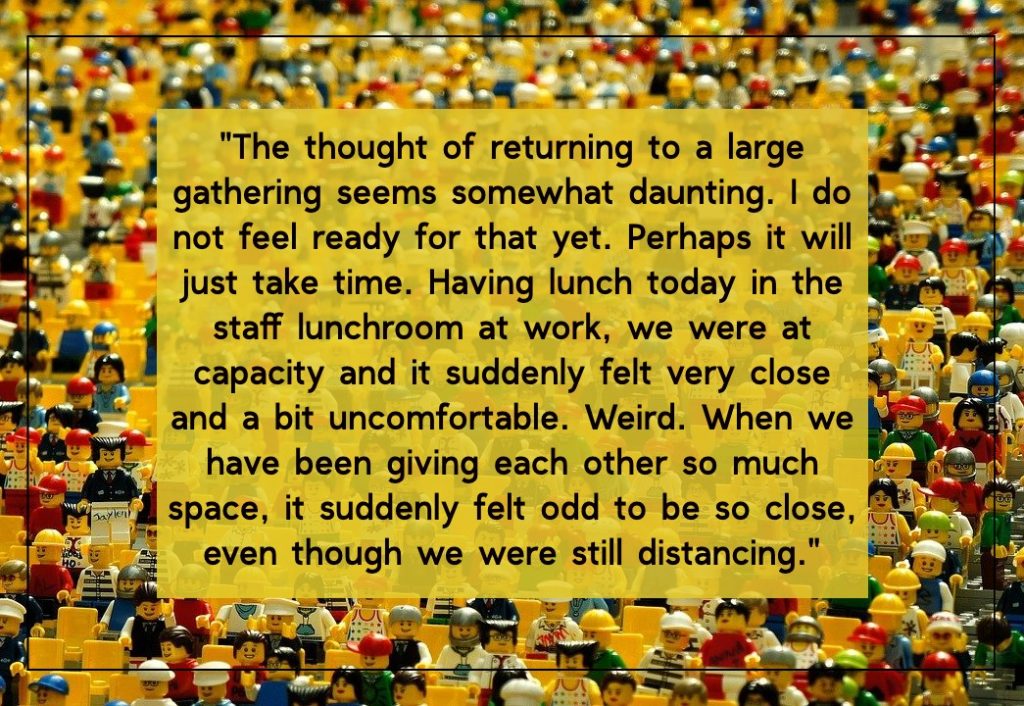
Being overpeopled easily:
We have been alone or with those in our own bubble for months. People doubt their capacity to be in a large room for hours, even at half capacity. They aren’t sure they can go from job to gym to dropping off kids at a practice to grocery shopping and then for drinks with a friend on a patio. They are already feeling anticipated pressure to go out as often as their more extroverted partner will want, accepting invitations from friends at a level that feels “too much”.
Many have the real concern that capacity for social connection has atrophied. Wouldn’t it make sense if it has—and will have to gradually be built up? We allow for people who have been in bed for months a period of rehab as they increase their physical capacity—I suggest we give ourselves permission to do the same.
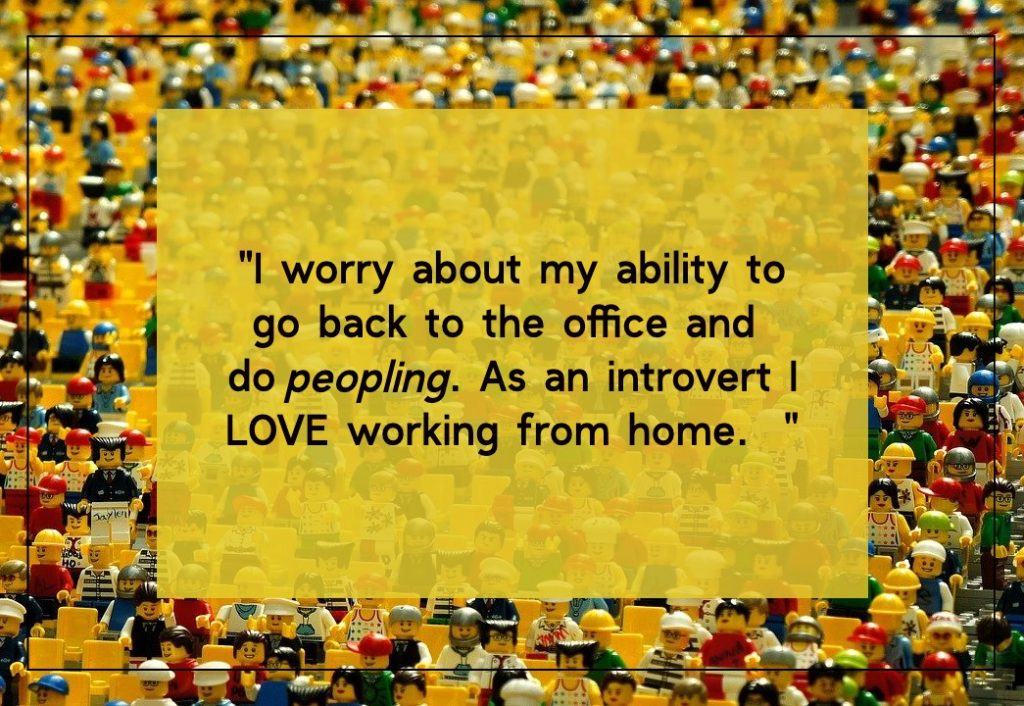
Loss of interest in community engagement:
Will our brains be so used to being at home that we will find it overwhelming to re-engage with the world? Folks wonder, “Have I lost capacity for activity? Will I have it in me to be as busy as I was before the pandemic?”
When we can get off the couch and emerge out of the house–we will actually do so? Will solitude and isolation be such a pattern that we find it difficult to learn the new patterns of being together in a post-vaccinated world?
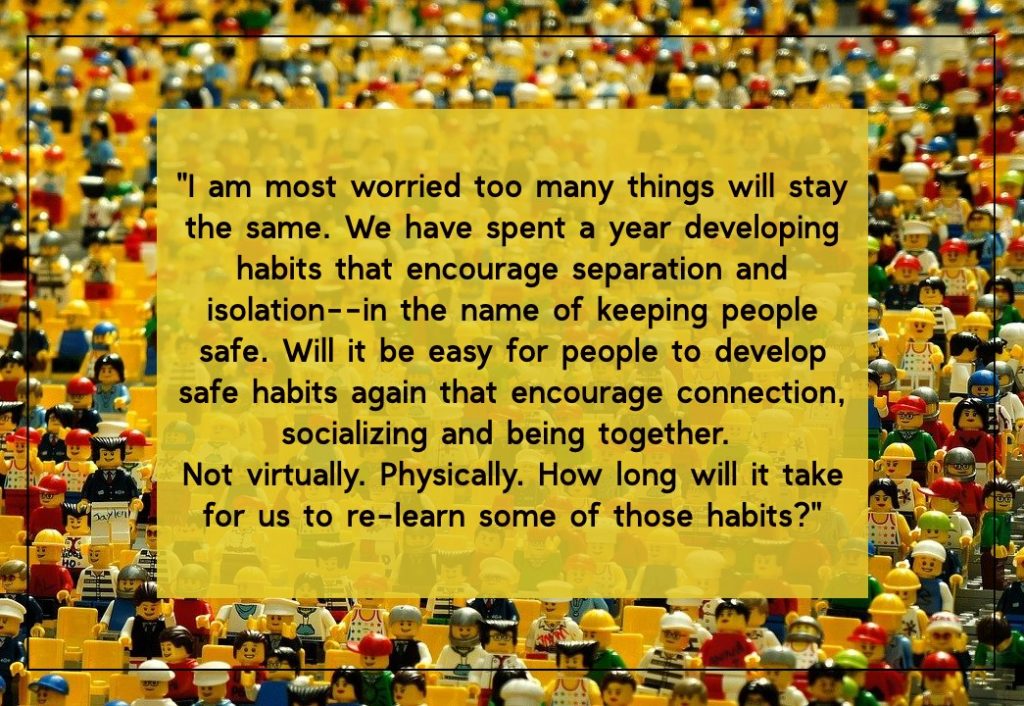
It will include smaller groups, continued masking, and concern about new variants of the virus–but will allow–no, expect–us to be out of the house more.
Will we resist the opportunities we have so longed for once we have a chance to engage?
Being powerless to get sucked into overcommitment again:
The perfectionists and pleasers amongst us were grateful that the pandemic said “No” on their behalf–“no” to volunteering at everything, to accepting every invitation to visit or bake or help. The pressure to sign up kids for so many activities that feels unsustainable is real.
The pandemic said, “no” when they were unable to—and the relief for the over-busy-person-who-felt-helpless-to-say-no was palpable.
Folks who overextended themselves got a break and caught their breath—and discovered that resentment and exhaustion disappeared. They are natural helpers who lost themselves in the bustle—and found their spirits rejuvenated during the pandemic.
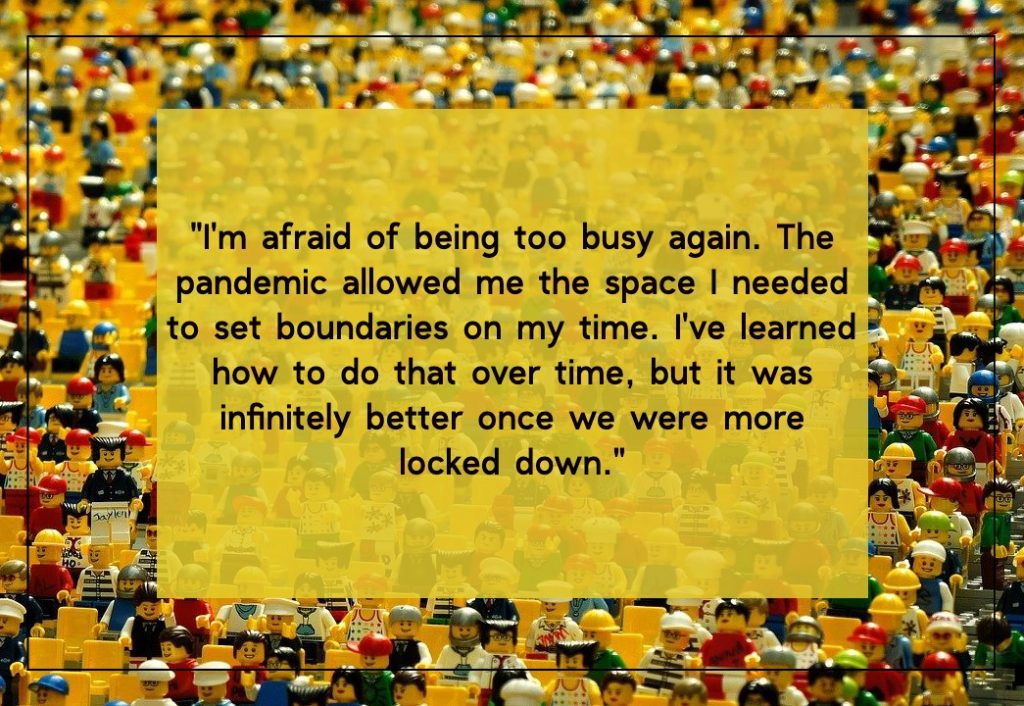
There is concern that the end of this means getting back on the treadmill of the uncontrollably fast rate. The challenge will be to notice when they are at a comfortable pace and choose the best yeses. It will mean learning to say your own no when the pandemic will no longer be the fallback no. Admittedly, this will be much harder for some than others.
Getting together with friends and family again:
You may not have seen some of these important folks in your life for months—but you may have seen their comments on social media that have felt uninformed or rude or hurtful. They may be staunch anti-vaccers. How does one reconnect with people when you have been grateful for the distance.
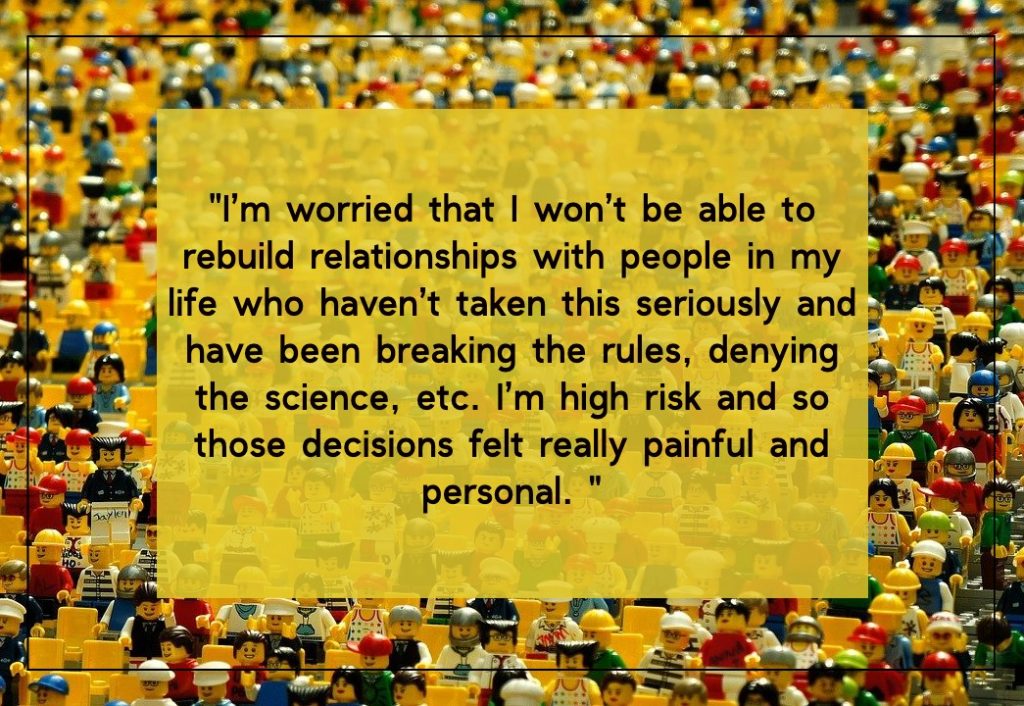
What sort of relationship will be possible when their views are so different from your own? How does one have the conversation that you are not able to attend an event with them if they remain unvaccinated?
Fear of shifting relationships.
We haven’t seen people who are important to us for a year!
How have they changed? Have I changed and they might not like me anymore?
Will we slip back into the old relationship comfortably like putting on a forgotten pair of sweat pants in the back of the closet, or will they feel like pre-pandemic jeans that don’t feel right given the extra inches around my waist?
Singles wonder: “Will there be room for me in families that have gotten so tight during pandemic? Will anyone want to be with me? Will others have closed up the space where I used to be in their lives and I will find myself alone?”
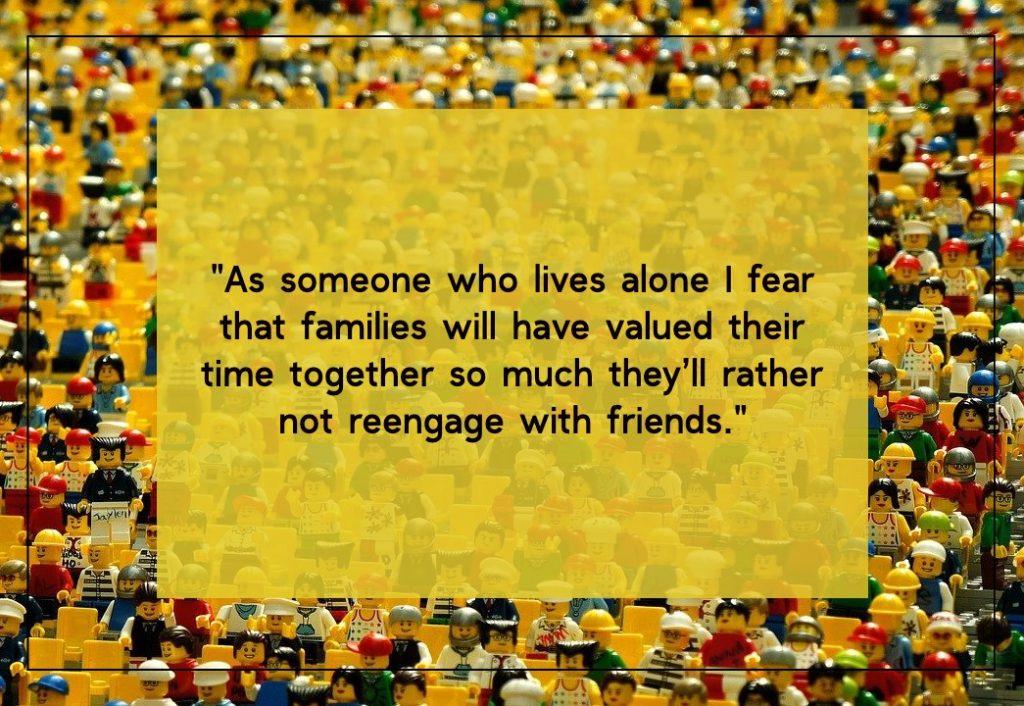
These question are real. The world has not been on “pause” like a movie on Netflix. While we have been at home, you’ve grown, they’ve changed, everyone is a bit different from living the last year.
Some relationships will shift out, while others will shift in. We will need to be naming this and checking in with each other. There will be holes in our lives. Other relationships will pick up right where they left off. It’s unknowable.
Concern that we will go back to being preoccupied with ourselves.
During this pandemic, we have given baking to our neighbours, checked in on folks who might be lonely—and others have done the same for us. There has been an awareness that we do better together. Will the world forget to be kind after the pandemic? Will all the good will, all the offers to help disappear once this pandemic is over?
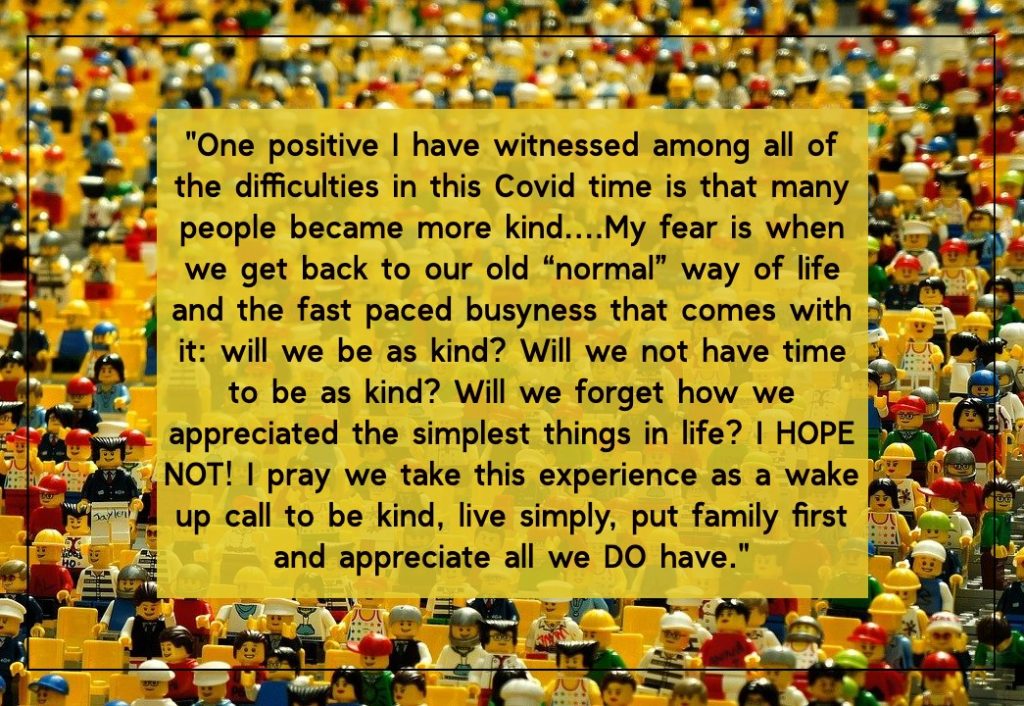
Yikes. This is real. We hope we don’t return to being so preoccupied with our own busy lives that we don’t notice others. History suggests it will.
I would like to commit to being part of an ongoing “kindness squad”. Will you join me?

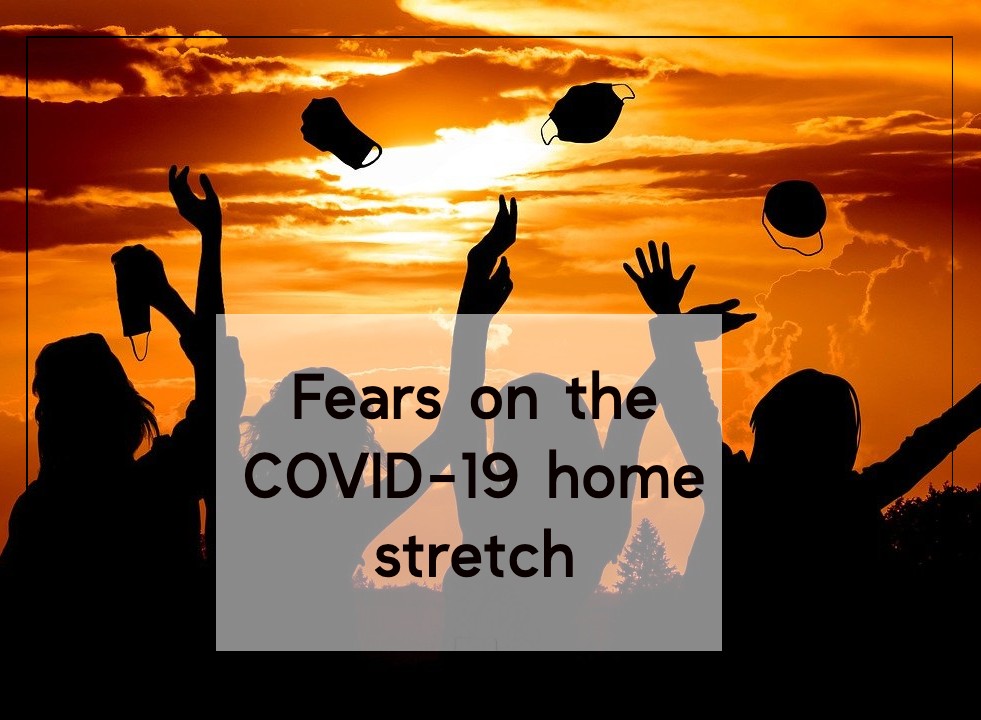





Write a Comment